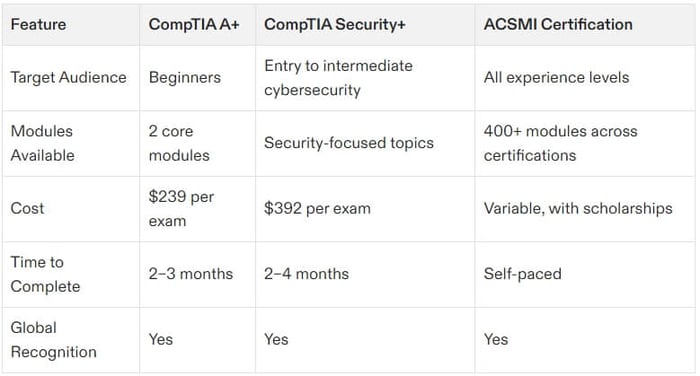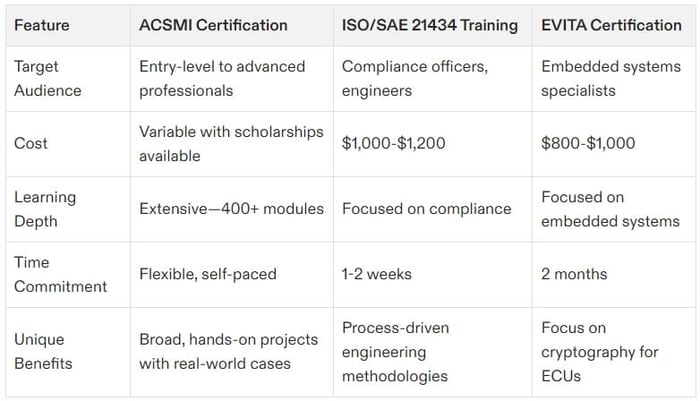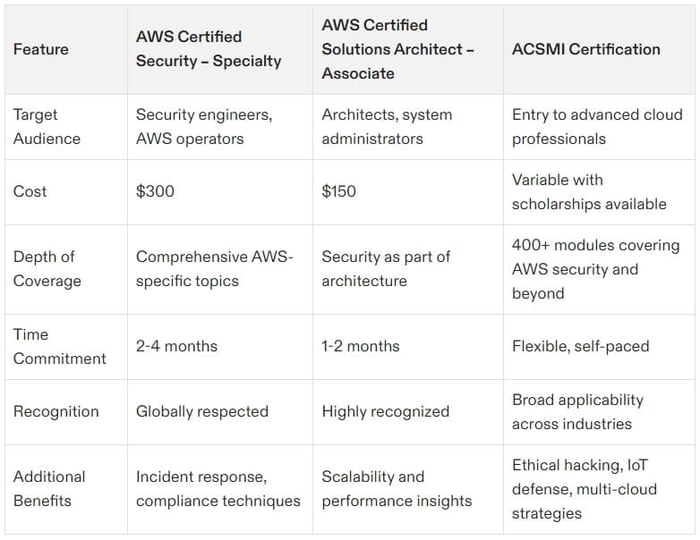Table of Contents
Cybersecurity is no longer a niche industry but a critical field that is crucial in today’s digital-first world and affects all aspects of business operations, government policies, and personal data protection. But with increasing global threats, the profession has become one of the most lucrative career paths in tech, as the demand for cybersecurity professionals has skyrocketed in recent years.
The rapid growth of cybersecurity has also led to an influx of certifications. Whether you're looking to enter the field or take your skills to the next level, following a Cybersecurity Certification Pathway is a key tool for enhancing your career prospects and earning potential. But how much does cybersecurity certification pay? How does having the right certifications impact your salary?
In this detailed guide, we will deep dive on how Cybersecurity Certification Pathway choices impact your pay. We will also find out the most lucrative certifications and the factors that affect salary growth in 2025, all while breaking down the numbers for entry-level, mid-level, and senior-level earnings.
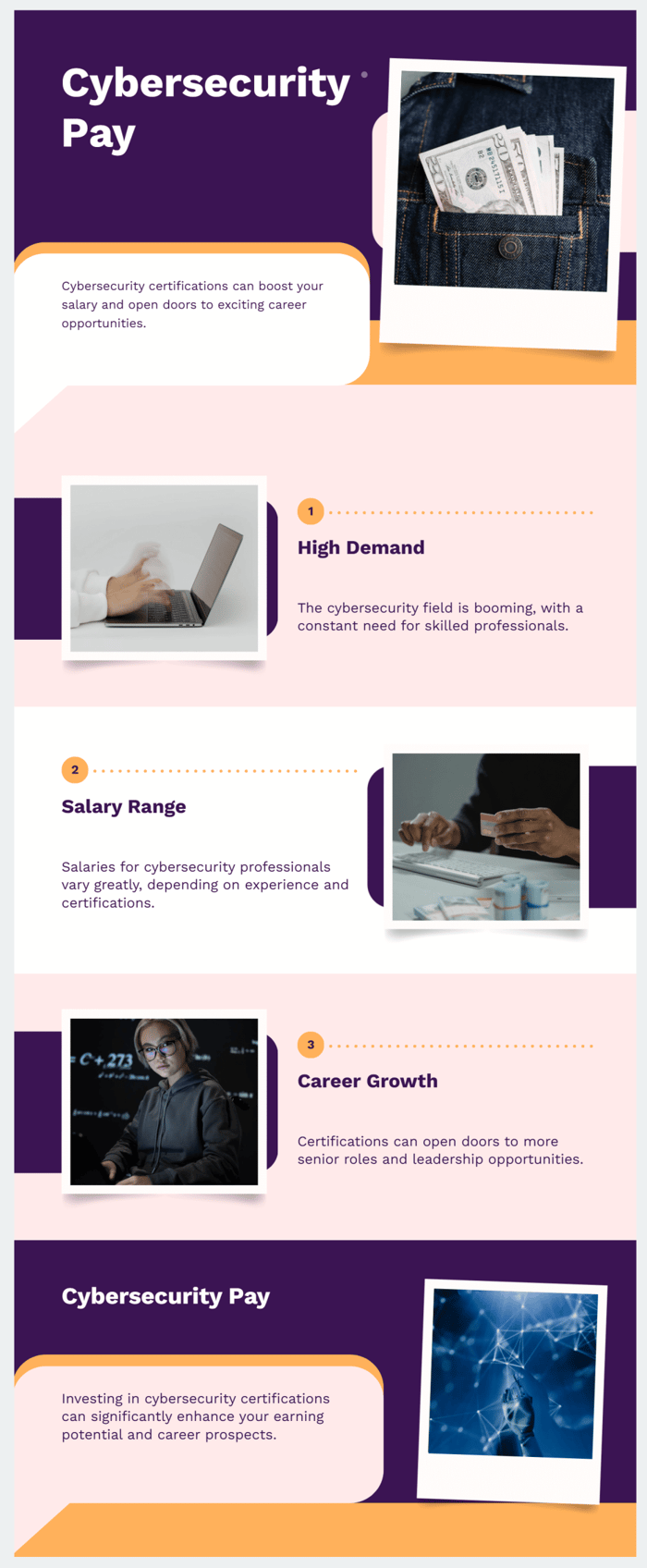
The Role of Certifications in Cybersecurity Salary Growth
Certifications are critical in the cybersecurity field, and they provide significant value in terms of both salary and career progression. In the following two ways we will look at how certifications impact salary growth.

1. Certification as a Trust Indicator
These are evidence of expertise in the field, called certifications. Many employers use certifications as benchmarks when hiring for cybersecurity roles. A cybersecurity certification is not only a mark of your technical skills, but it is also proof of your passion and willingness to learn and update yourself in the ever-growing threat matrix.
For instance, there are established reputations of expertise with certifications like CISSP (Certified Information Systems Security Professional) or the ACSMI certification. In 2025, employers will still value certifications that are related to new cybersecurity domains that appear, for instance, AI-based security and cloud computing, and therefore, these certifications will become more crucial.
2. Access to High-Paying Roles
Not only do they help you show your skills, they are the ticket to high-paying jobs. Cybersecurity is an industry that demands certain specialization and therefore has job roles such as security architect, penetration tester, and cloud security engineer, all of which are associated with a significant salary increase. Thus, as the demand for cybersecurity professionals increases, certifications become a crucial way for professionals to transition to these positions that frequently come with six-figure salaries.
How Much Does Cybersecurity Certification Pay?
The potential for earning in cybersecurity largely depends on your experience level, the certifications you hold, and the role you’re pursuing. Below is a breakdown of the average cybersecurity certification pay for entry-level, mid-level, and senior-level professionals, along with the Cybersecurity Certification Exam Fee, which varies based on the certification provider and exam level.
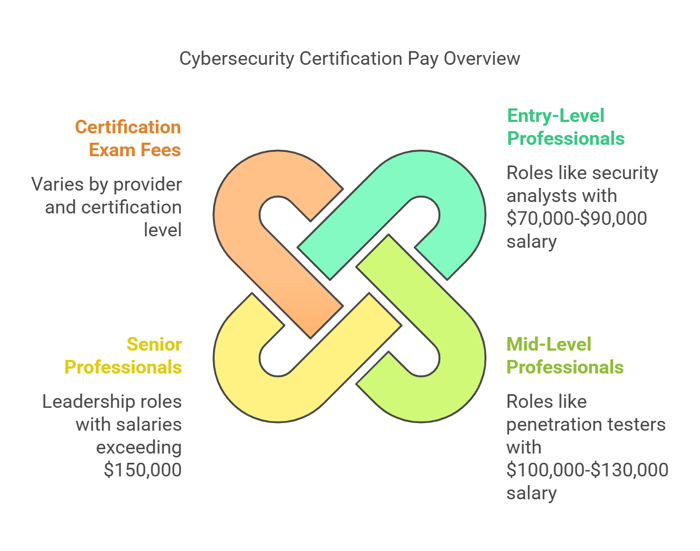
Entry-Level Professionals
In cybersecurity, someone who is new to the field can stand to gain a lot from holding a foundational certification that would boost their starting salary. The rates for security analysts, IT specialists, or incident responders are usually $70,000 to $90,000 annually. But, if you have a well-regarded certification it can get you a 10% to 25% raise.
Foundation certifications such as Security+ or the ACSMI Foundation Modules can help to increase the earning potential of an employee in an entry-level position. Further, as cybersecurity threats are still evolving, in 2025 the need for entry-level workers will still be on the rise as companies seek to hire people to fill crucial positions to safeguard their digital assets.
Mid-Level Professionals
For those with 3-5 years of experience in the field, the salary increases significantly with cybersecurity certification. Mid-level positions like penetration testers, network security analysts, and risk management professionals can earn anywhere between $100,000 and $130,000 a year.
For these roles, certifications like Certified Ethical Hacker (CEH) or Certified Cloud Security Professional (CCSP) are in demand. As organizations continue to rely on cloud services, AI technologies, and automation, those professionals with certifications in these areas can reasonably expect to see salary growth through 2025 and beyond.
Senior Professionals
At the senior level, there is a high demand for cybersecurity professionals to fill leadership positions like Chief Information Security Officer (CISO), security managers, and cloud security architects. These positions pay over $150,000 in salary and in some niche areas like cloud security, the salary can exceed $200,000.
For senior positions, it is usually necessary to have advanced certifications like CISSP, CISM (Certified Information Security Manager), or OSCP (Offensive Security Certified Professional). The ACSMI certification that offers 400+ modules covering the latest technologies such as AI-integrated cybersecurity will also become more valuable as ACSIs as security leaders try to cope with ever more complicated systems.
The Most Lucrative Cybersecurity Certifications
While there are many cybersecurity certifications to choose from, not all of them provide the same level of salary potential. Below are some of the most lucrative certifications that can significantly impact your earnings, and you can maximize your savings by taking advantage of a Cybersecurity Certification Discount.
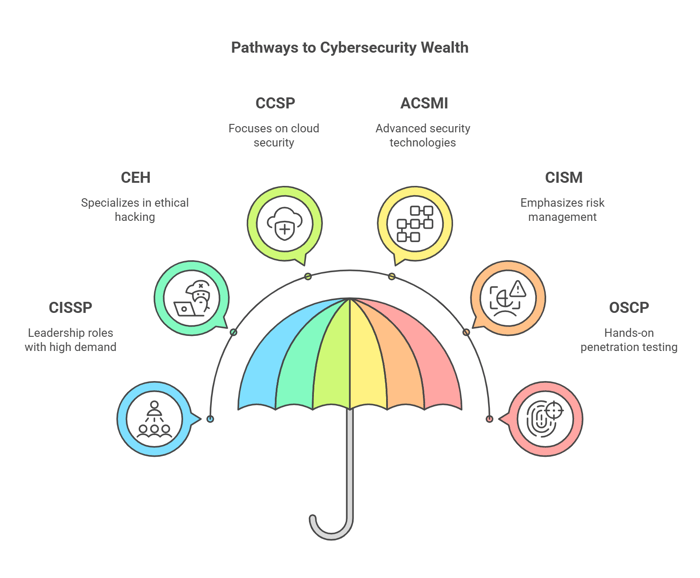
1. CISSP (Certified Information Systems Security Professional)
CISSP is considered the gold standard of cybersecurity certifications, and CISSP holders earn an average salary of $135,000 per year. CISSP is ideal for experienced professionals wanting to transition into leadership positions like CISO, security manager, or security architect. Cybersecurity threats are only going to become more complex in 2025, and the need for CISSP-certified professionals will continue to grow, further bumping up salaries.
2. Certified Ethical Hacker (CEH)
The Certified Ethical Hacker (CEH) certification is perfect for penetration testing and ethical hacking, so if you’re interested in either of those, this certification is perfect for you. This is because professionals who have this certification can earn an average of $15,000 more every year than their uncertified counterparts. In 2025, ethical hackers will still be in demand especially as the dark web and ransomware attacks become more elaborate.
3. Certified Cloud Security Professional (CCSP)
As cloud computing grows, so does the demand for CCSP holders, who can earn between $135,000 and $160,000 a year. This certification is perfect for those who are interested in focusing on the security of cloud platforms since this is a major concern for organizations shifting their infrastructure to the cloud in 2025.
4. ACSMI Certifications
The ACSMI certification offers unparalleled depth, covering over 400 modules, including advanced areas like AI-driven security, quantum computing, and blockchain security. Professionals who obtain ACSMI certifications are in high demand and often earn significantly higher salaries due to their specialized knowledge. In 2025, ACSMI-certified professionals will be particularly well-positioned to tackle the evolving challenges posed by AI and blockchain technologies.
5. CISM (Certified Information Security Manager)
The CISM certification is for professionals interested in information security management and risk management. This certification holds a salary of between $125,000 to $175,000 annually, especially for leaders. As risk management becomes more critical in the digital environment, CISM professionals will remain very much in demand in 2025.
6. OSCP (Offensive Security Certified Professional)
OSCP is one of the most hands-on certifications focusing on penetration testing and cyber-attack simulations. OSCP holders can expect 15% to 20% salary boosts, with many professionals making $105,000 or more a year. As companies continue to focus on real-world penetration testing in 2025, OSCP-certified professionals will see sustained demand and high salary growth.
Factors Impacting Cybersecurity Certification Pay
When evaluating cybersecurity certification pay, it's important to consider more than just the certifications themselves. Several factors influence how much you can earn in the cybersecurity field.

1. Geographical Location
The region in which one works is a major determinant of the cybersecurity salary. The job market is more competitive and the need for skilled cybersecurity professionals is higher in the United States, United Kingdom, Canada, and Australia that is why they provide higher salaries. The cities with the high tech hubs for instance Silicon Valley, London, or Sydney are the most paying since they are the hub of tech firms and have more complex cybersecurity issues.
Global job markets and remote work will continue to define the expectations of salaries in 2025. People with certifications can get global employment from high-paying companies, especially if they work remotely or are willing to relocate.
2. Industry Demand
Some industries pay more because they deal with more sensitive information and depend a lot on cybersecurity. For instance, finance, healthcare, government, and insurance are some of the industries that usually provide high salaries for cybersecurity experts. These industries are critical to cybersecurity and data protection and therefore require certification in specific areas.
3. Practical Hands-On Experience
Certifications that include hands-on training and real-world simulations generally lead to higher salaries. Employers value candidates who not only understand theoretical concepts but can also demonstrate practical expertise in areas like network defense, cloud security, and penetration testing.
Certifications that offer interactive labs, like those from ACSMI, prepare candidates for real-world challenges, helping them earn higher starting offers and faster salary growth.
4. Specialization and Certification Level
The level of certification you obtain will determine the level of payment that you will receive. Entry level certifications like Security+ are good to have for beginners, but for the specialized jobs, you need certifications like CISSP or ACSMI. The earning potential increases with the specialization in hot categories like cloud security, ethical hacking, or AI in cybersecurity.
Final Thoughts
The cybersecurity certification pay landscape is influenced by multiple factors, from certification type to industry demand. With the rapid evolution of cybersecurity technologies and the rise of AI-driven security in 2025, earning the right certifications can significantly boost your salary and career prospects. By starting with foundational certifications and advancing to specialized ones like ACSMI or CISSP, you position yourself for long-term success in one of the most lucrative and rapidly growing industries.
FAQs on Cybersecurity Certification Pay
1. How does a cybersecurity certification affect pay?
Certifications validate your skills and make you eligible for higher-paying roles. On average, certified professionals earn 15–25% more than their uncertified peers.
2. Which certifications lead to the highest salaries?
Certifications like CISSP, CEH, and ACSMI programs offer some of the highest salary increases in cybersecurity. They open doors to specialized, high-paying roles.
3. Are beginner certifications worth it?
Absolutely. Certifications like Security+ and ACSMI’s foundational modules are perfect for newcomers and can immediately boost entry-level salaries.
4. Does experience matter if I have certifications?
Experience complements certifications. For senior positions, combining experience with advanced certifications like CISSP will lead to higher pay.
5. Why is ACSMI a standout certification provider?
ACSMI offers a well-rounded curriculum, hands-on training, and global recognition, making it a top choice for increasing pay potential in cybersecurity.
6. How much does CISSP certification increase salary?
CISSP certification can increase your salary by $15,000–$30,000 annually, with experienced professionals earning $135,000 or more.
7. What is the average salary of a cybersecurity professional with a certification?
The average salary for certified cybersecurity professionals ranges from $70,000 for entry-level roles to $200,000+ for senior positions in specialized fields like cloud security.
8. How often should I update my certifications?
Most cybersecurity certifications need to be renewed every 2–3 years to ensure they remain valid. Regular updates help you stay current with evolving technologies and threats.



